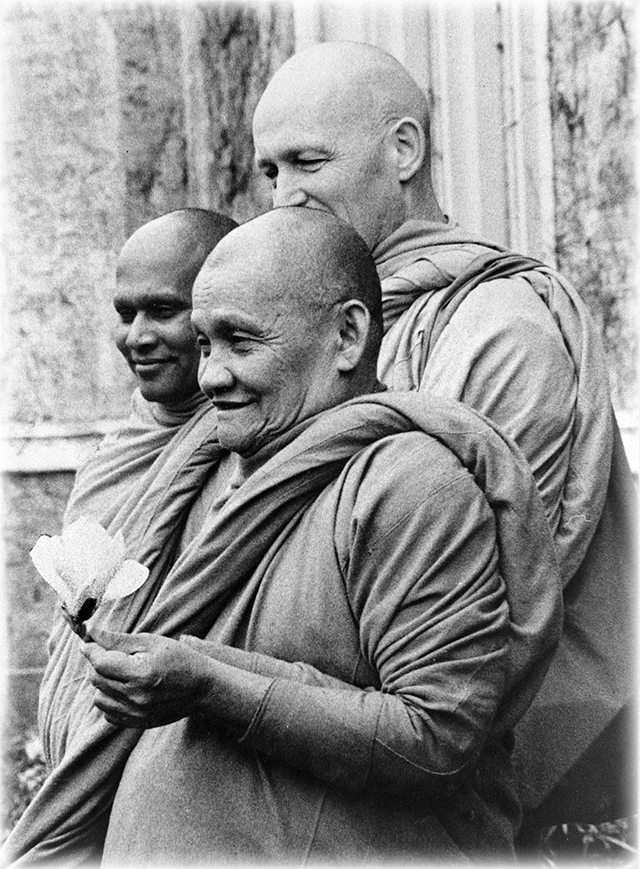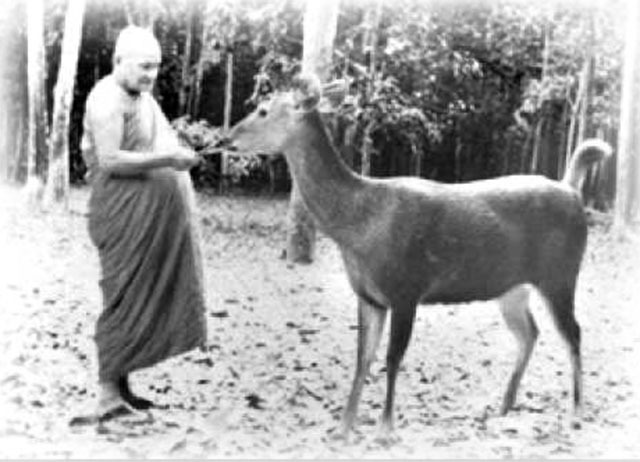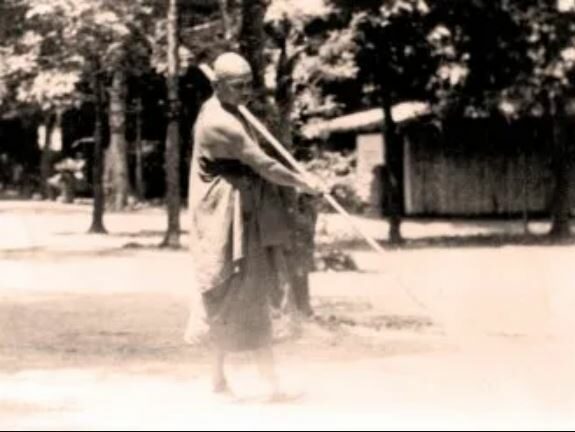
Ajahn Chah Subhatto (1918–1992)
Ajahn Chah Subhatto was a highly influential figure in modern Thai Buddhism and a central pillar of the Thai Forest Tradition. His teachings on meditation, mindfulness, and monastic discipline have left an enduring legacy that continues to inspire and guide Buddhists around the world.
Early Life and Ordination
Born on the 17th of June, 1918, in a rural village in Ubon Ratchathani Province, Thailand, Ajahn Chah was named Chah Subhatto. From a young age, he displayed a keen interest in spiritual matters and showed a natural inclination towards a monastic life. At the age of nine, he lost his father, which further fueled his desire to seek spiritual truths beyond the mundane world.
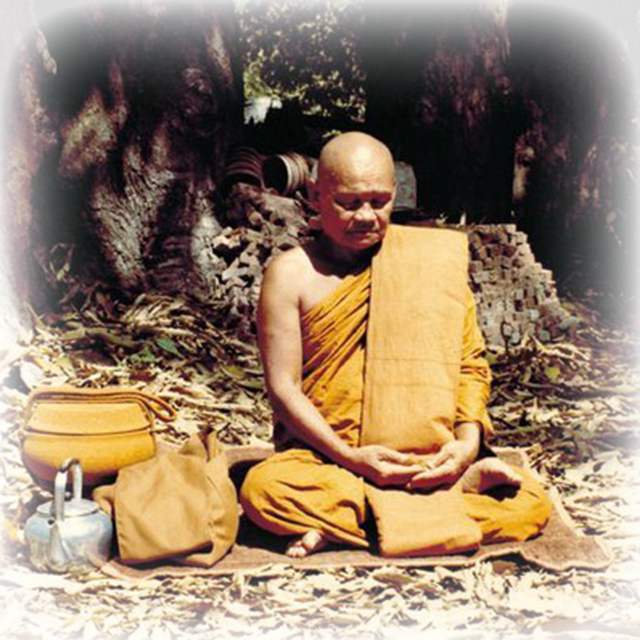
In 1939, at the age of twenty-one, Chah ordained as a novice monk at Wat Ban Nong in his home province under the guidance of Ajahn Mun Bhuridatta Thera, a revered meditation master and the founder of the Thai Forest Tradition. Ajahn Chah’s encounter with Ajahn Mun marked the beginning of his intensive training in meditation and monastic discipline, which would shape his spiritual journey profoundly.
Training and Teachings
Under Ajahn Mun’s tutelage, Ajahn Chah embraced the rigorous lifestyle of a forest monk (tudong), wandering through the rugged landscapes of Thailand’s northeast region. This period of solitude and austerity deepened his understanding of the Buddha’s teachings, particularly the practice of meditation as a means to transcend suffering and attain enlightenment.
Ajahn Chah’s teachings emphasized simplicity, mindfulness, and the direct experience of Dhamma. He encouraged his disciples to cultivate present-moment awareness (sati) in all activities, whether walking, sitting, or performing daily tasks. His straightforward and practical approach to meditation appealed to both monks and laypeople, making the profound teachings of Buddhism accessible to all.
Founding of Wat Nong Pah Pong
In 1954, Ajahn Chah established Wat Nong Pah Pong Monastery in Ubon Ratchathani, laying the foundation for a community of monks dedicated to rigorous meditation practice and strict adherence to Vinaya (monastic discipline). Wat Nong Pah Pong became a center for the revival of the Thai Forest Tradition, attracting monks and novices eager to train under Ajahn Chah’s guidance.
Influence and Spread of the Thai Forest Tradition
Ajahn Chah’s reputation as a meditation master and Dhamma teacher grew rapidly, both within Thailand and internationally. His teachings resonated deeply with practitioners seeking spiritual guidance in an increasingly complex world. Monks and laypeople from various backgrounds traveled to Wat Nong Pah Pong to receive instruction directly from Ajahn Chah, drawn by his wisdom, compassion, and unwavering commitment to the path of liberation.
Recognition and Later Years
Throughout his life, Ajahn Chah remained dedicated to the training of monks and the dissemination of Buddhist teachings. His monastic community expanded, establishing branch monasteries (sala) across Thailand and eventually spreading to other countries, including England, Australia, and the United States.
Ajahn Chah’s teachings were characterized by their practicality and depth, addressing the universal truths of impermanence, suffering, and non-self. He emphasized the importance of moral conduct (sila), mental cultivation (samadhi), and wisdom (panna) as integral aspects of the path to liberation.
Legacy and Passing
Ajahn Chah’s legacy and influence extend far beyond his physical presence, as his disciples, known as “Looksit”, continue to propagate his teachings worldwide. This ensures that the wisdom of the Thai Forest Tradition remains accessible to future generations.
Above; Ajahn Chah, in his typical manner, demonstrates compassionate and selfless behavior towards a deer, epitomizing the principles of loving-kindness and interconnectedness. His gentle demeanor, and caring attitude towards all living beings, including animals, underscore the significance of treating all creatures with respect and kindness. This touching scene, serves as a powerful example of the transformative potential of Buddhist teachings and the importance of cultivating compassion in our daily lives.
During the initial stages of the twentieth century, Theravada Buddhism experienced a resurgence in Thailand, led by esteemed teachers aiming to elevate the caliber of religious practice nationwide. One such influential figure, perhaps the most, was Ajahn Mun, whose stringent standards were upheld and advanced by Ajahn Chah upon his succession as a teacher.
Adherents of this lineage rigorously observe the vinaya, the primitive monastic code established by the Buddha. Historical divisions within the Buddhist sangha often stemmed from controversies surrounding the appropriate set of disciplinary rules; some factions favored a more pliable code, while others adhered to a stricter version, each asserting authentic adherence to the Buddha’s original formulation. The Theravada tradition aligns with the latter perspective. A stringent example pertains to dietary regulations: the adherence to consuming food solely between dawn and noon. Monastics in the Thai Forest Tradition further practice mono-meal consumption during mornings, one of the thirteen dhutanga. These voluntary ascetic practices, approved by the Buddha, intensify meditation and cultivate contentment with basic necessities. Other practices encompass sleeping beneath trees, or residing in sequestered forests or cemeteries.
Ajahn Chah passed away peacefully on the 16th of January, 1992, at Wat Nong Pah Pong, leaving behind a profound legacy of spiritual awakening and compassionate guidance. Ajahn Chah’s teachings have had a profound impact on the lives of countless individuals, providing them with a spiritual foundation that has helped them navigate the challenges of life and find inner peace. His teachings emphasize the importance of mindfulness, meditation, and living a simple, ethical life, and he encouraged his followers to cultivate these qualities in their daily lives.
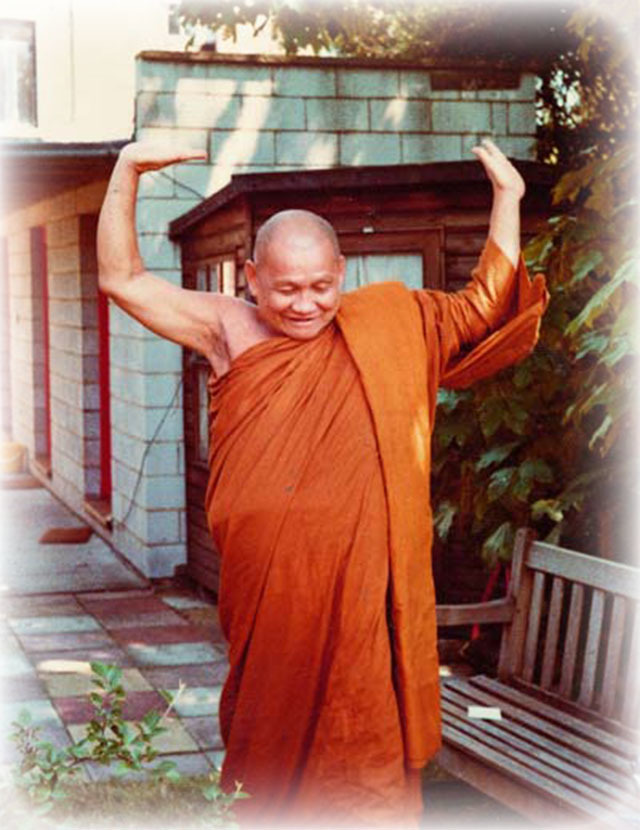
Ajahn Chah (1918-1992) was a renowned Thai Buddhist monk who played a significant role in the establishment of Theravada Buddhism in the West. As an influential teacher of the Buddhadhamma, he founded two major monasteries in the Thai Forest Tradition and gained widespread respect and admiration for his wisdom. After his passing in 1992, his funeral was attended by over one million people, including members of the Thai royal family, due to the large number of mourners expected to pay their respects. Ajahn Chah’s legacy includes a collection of dhamma talks, a network of monasteries, and numerous students who have carried on his teachings.
Through his teachings and example, Ajahn Chah has inspired a community of monks and laypeople who continue to carry on his legacy. His disciples have established meditation centers and temples around the world, providing a place for people to learn and practice the teachings of the Thai Forest Tradition. These centers offer a range of programs and activities, including meditation retreats, Dhamma talks, and other spiritual practices, all of which are designed to help individuals cultivate mindfulness, concentration, and wisdom. Ajahn Chah’s legacy is not limited to his teachings, however. He also played a significant role in preserving and promoting the Thai Forest Tradition, which is one of the most respected and venerable Buddhist traditions in Thailand. Through his efforts, this tradition has been passed down to future generations, ensuring that the wisdom and teachings of the Buddha continue to be accessible to all.
